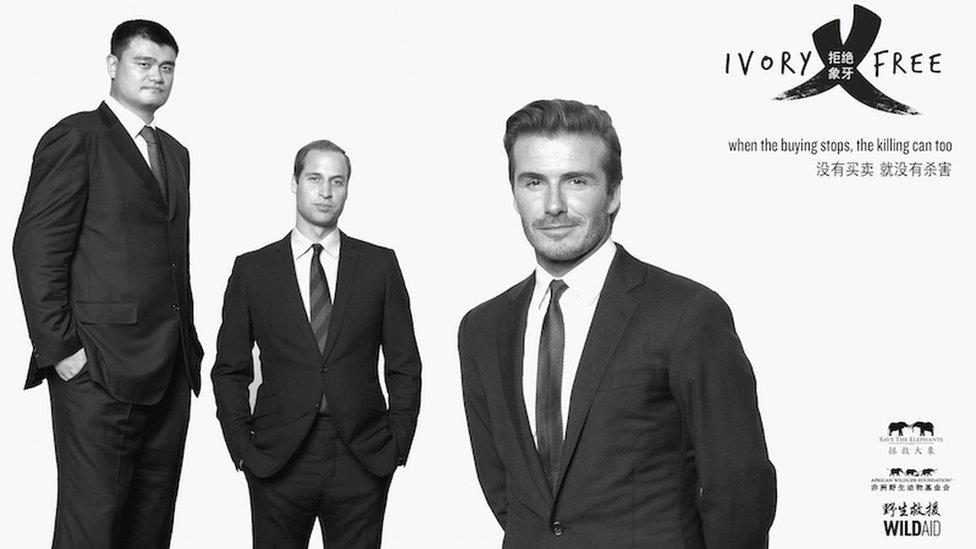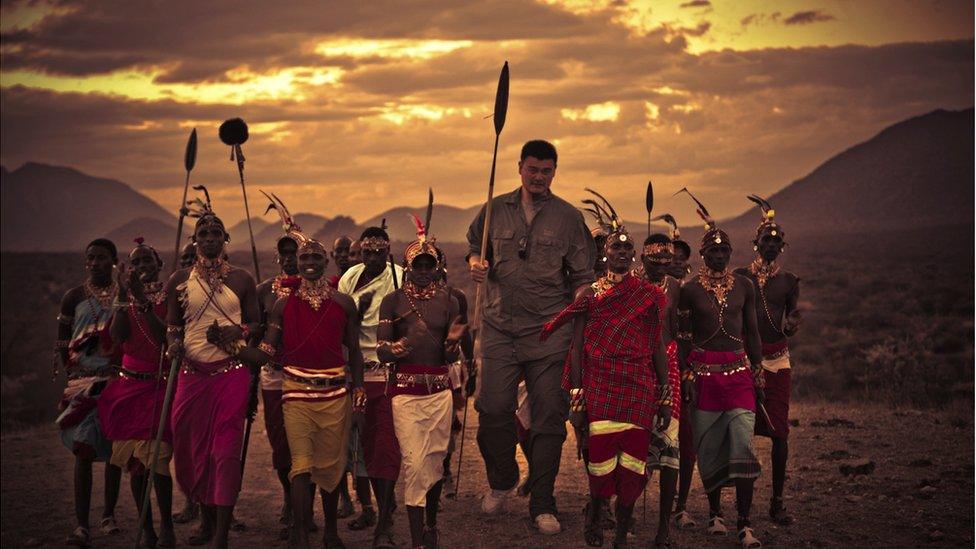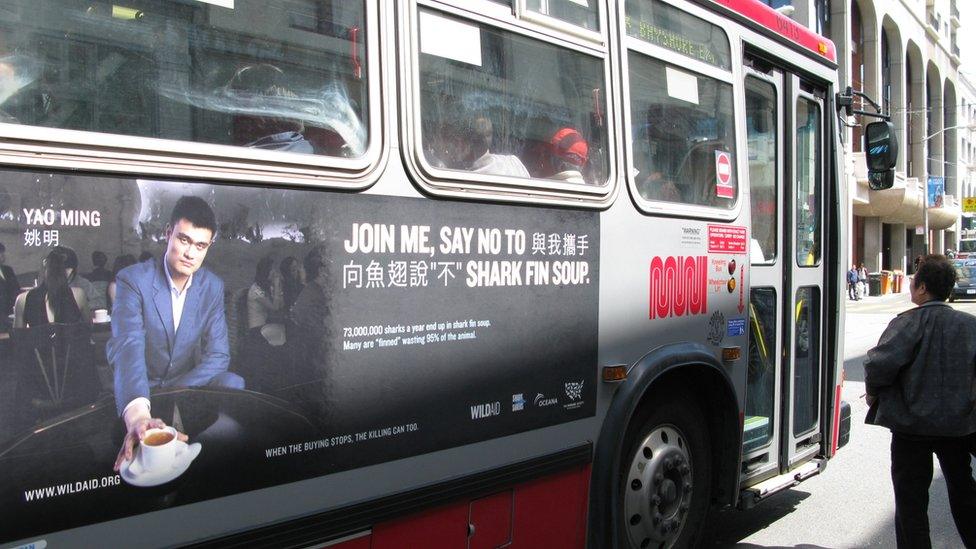Are celebs the best hope for saving endangered species?
- Published

Can the influence of celebrities really achieve a breakthrough in reducing demand for endangered species?
As the Cites meeting in Johannesburg ends, Matt McGrath asks whether celebrities are having a bigger impact on saving species than the international body tasked with regulating the trade in threatened animals and plants.
The poor old peregrine falcon must feel like a total loser at this point.
Driven to the edge of extinction in the 1960s and 70s thanks to the use of pesticides based on DDT, the world's fastest predator has made a remarkable recovery over the past 30 years. So much so that there is hardly a cathedral in the UK that doesn't have at least one of these high flying raptors.
All that progress though, hasn't made a difference here at the Cites, external meeting in Johannesburg, which has just drawn to a close. Cites (the Convention on International Trade in Endangered Species of Wild Fauna and Flora) aims to ensure that the trade in specimens of wild animals and plants does not threaten their survival.
Despite plenty of data to say the falcon has recovered and that restrictions on trade should be loosened, the countries meeting here decided to keep it on the highest level of protection.
"The peregrine falcon met the criteria for down-listing to Appendix II," said Heather Sohl, with WWF-UK
"The parties discussed it but didn't agree to follow that, sometimes the science isn't always followed."
Many here would say the peregrine falcon was an unfortunate exception. It would appear that science rather than politics is becoming a stronger factor in these discussions on which species to protect and which to reject.
For instance, at the last meeting in 2013 in Thailand, a number of shark species were up-listed after a huge political battle that succeeded by just one vote.
This time round, new safeguards for other sharks and devil rays, sailed through with huge majorities. Experts say this is because the regulations have been seen to work.

Chinese basketball star Yao Ming travelled to Africa to see for himself the impact of Asian consumption on elephants and rhinos
But while there were science-based victories for Barbary macaques, African grey parrots and a host of other species, politics does still play a part in some of the biggest controversies.
The decision to allow the EU to vote as a bloc had a major impact on one of the key debates about elephants.
With about 130 countries actually voting on the floor, the EU group of 28 stopped the proponents of greater protection for elephants from securing the two-thirds majority needed to change the Convention.
The EU argued that the science wasn't strong enough. Many campaigners thought it was plain old dirty politics.
"It just doesn't make sense biologically, it's a political decision," Dr Roz Reeve, an adviser to the David Shepherd Wildlife Foundation, who thinks the EU sided with South Africa, which was against the proposal.
"South Africa is the dominant voice on the continent, it's the largest economy on the continent, that's the only thing I can think of that might be driving this position."
South African ministers were delighted that the up-listing of all African elephants was defeated.
They see it as a justification of their policies that have seen their elephant populations less affected by poaching than almost anywhere else in Africa. They argue that imposing greater protection on their elephants would have been an insult to ordinary South Africans.
"Had we taken this elephant to Appendix I, our people would have been denied the opportunity to benefit from them," said Edna Molewa, South Africa's minister for water and environmental affairs.
"What's making the Southern African elephant population thrive is that the people are utilising them and benefiting and they feel that they are protecting them, they are part of them.
"We feel that the rest of the continent and the rest of the world should go that way."
This question of the uneasy relationship between humans and animals was a strong undercurrent at this meeting.
Country after country argued that more needed to be done to give people living next to threatened species a cash-in-hand reason for keeping them alive.
But perhaps there's another way, and what's really needed is a massive injection of celebrity power.
There is growing evidence that the impact of sports stars, artists and well-known business people are making a big difference in educating people about the impacts of consuming products based on threatened species, and the positive benefits from their protection.
In China, the popularity of former NBA basketball star Yao Ming has made a huge difference on awareness of species - not just with the public but with the government too.
"He proposed to the National People's Congress the ban on ivory sales, which was later adopted by the Chinese government," said Peter Knights from Wildaid, who worked with Yao Ming on a documentary designed to raise awareness of the impacts of consumption on elephants and rhinos.
"That is actually the only non top-down process in China, through the Congress- and the ivory trade ban is an example of that happening."
Connecting celebrities to the Cites process could be a key step forward in forcing countries to take action.

Yao Ming's image on a bus urging people to stop consuming shark fin soup
It already seems to be having an impact. Take, for example, pangolins.
"A few years ago most people didn't know what a pangolin was, probably most still don't but a lot more do know something about these scaly anteaters," said Heather Sohl from WWF-UK.
"But there have been campaigns where Prince William has been working with Angry Birds to get the youth understanding that these are the most heavily traded mammals in the world - and from that we've seen at this conference, proposals to give them greater protection successfully passed."
This Cites conference has done much good work to protect threatened species. Apart from the peregrine falcon and perhaps the elephants, governments listened to the science and acted on it. For all its limitations, Cites remains the only safeguard for species that has real teeth.
But there is only so much you can do with regulations. To really ensure the survival of species, you need hearts and minds. And that's where celebrities really can connect the Convention to the public. Some think this combination could make the peaceful co-existence of man and beast a reality.
"It is this whole attitude to wildlife consumption, it is a once and forever societal change," said Wildaid's Peter Knights.
"We used to do this in the UK and US, and then society kind of moves away from it, and this is where Asia is right now - this is a tipping point right now."
Follow Matt on Twitter @mattmcgrathBBC, external and on Facebook, external.